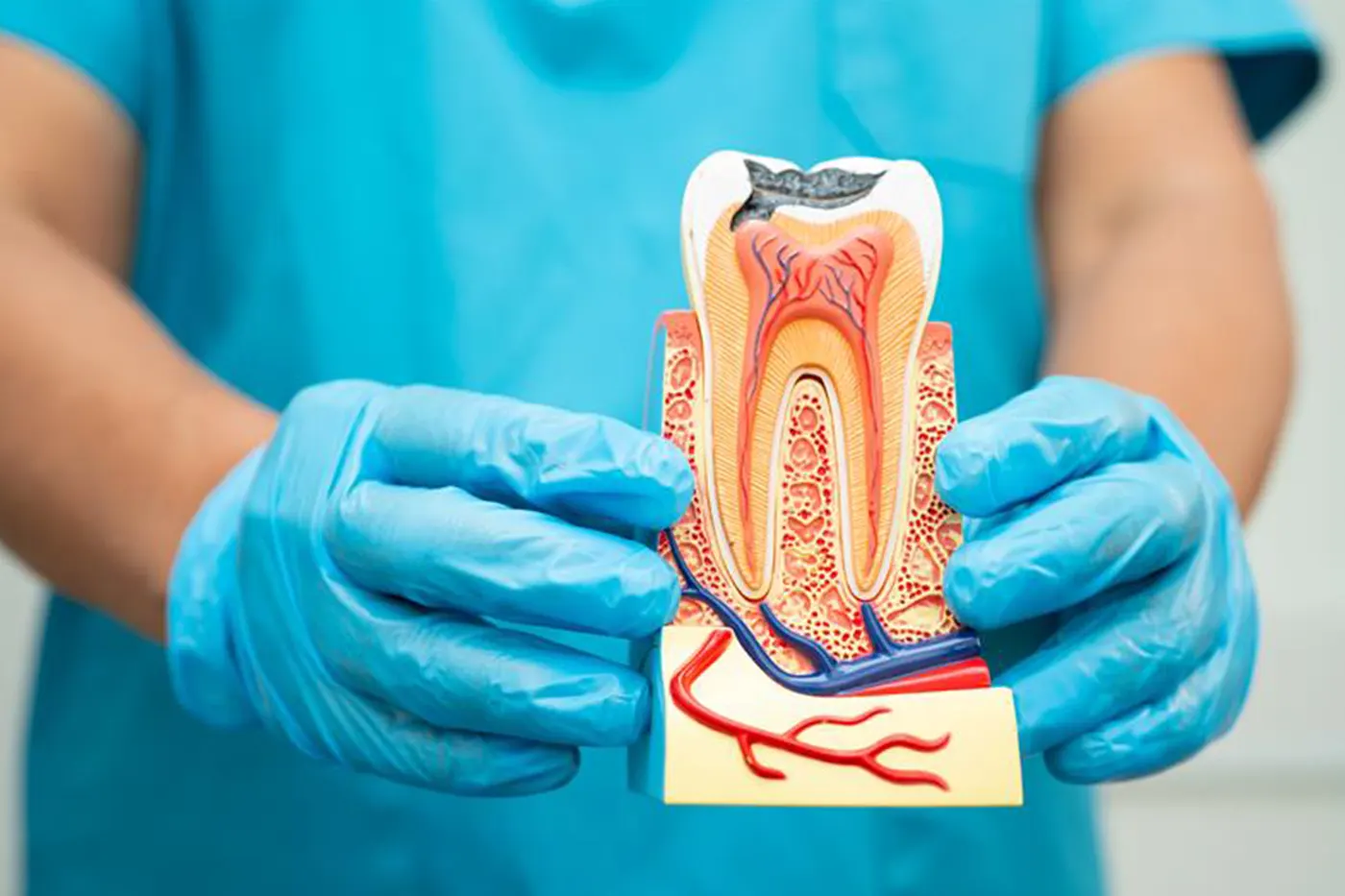
Is Wisdom Teeth Removal Necessary? Key Signs to Watch For
April 17, 2025
Orthodontic Treatment for Adults: Braces and Invisalign Options
June 19, 2025If you’ve ever felt a sharp, sudden jolt of discomfort when your teeth meet something hot, cold, sweet, or acidic, you’re not alone. At Axiom Dental, we see this concern often, and the good news is: it’s manageable. Let’s explore the causes of sensitive teeth and the treatments available to restore comfort and confidence to your smile.
Root Causes of Tooth Sensitivity
To understand tooth sensitivity, you need to understand the anatomy of your teeth. Underneath the tooth enamel (the hard, protective outer layer) lies dentin, a softer tissue filled with tiny tubules that lead directly to the tooth’s nerve. When dentin becomes exposed, typically due to enamel erosion or gum recession, these pathways allow external stimuli (heat, cold, or pressure) to trigger pain.

Common causes of dentin exposure include:
- Gum Recession: When gum tissue begins to pull away from your teeth, it can expose root surfaces that are not protected by enamel. This is often associated with gum disease or overly aggressive brushing.
- Enamel Erosion: Acids from food and drinks, especially citrus fruits, soda, and wine, can gradually wear down enamel. Medical conditions like acid reflux can also contribute.
- Teeth Grinding (Bruxism): If you grind your teeth at night, the constant pressure can wear away enamel and aggravate nerve sensitivity.
- Brushing Habits: Using a hard-bristled brush or brushing your teeth too forcefully can lead to receding gums and exposed dentin.
- Teeth Whiteners: Some whitening agents, particularly over-the-counter or frequent-use products, can lead to temporary or prolonged sensitivity.
- Cracked Teeth or Fillings: Mini fractures can create access points for irritants to reach the tooth’s nerve.
- Dental Procedures: Sensitivity after cleanings, fillings, or crown placements is common and typically temporary.
This condition is often referred to as dentin hypersensitivity, and its severity can range from mildly irritating to disruptive and painful.
Diagnostic Tools to Pinpoint the Problem
One of the benefits of visiting Axiom Dental is our thorough approach to diagnosis. We use high-resolution imaging and sensitivity tests to locate problem areas and evaluate the integrity of enamel and gum tissue. In some cases, the pain may be referred from another tooth or even the jaw, so getting an expert opinion ensures you’re addressing the right issue.
At-Home Relief: Managing Sensitivity Daily
There are practical, gentle strategies you can apply at home to ease discomfort:
- Switch to a Desensitizing Toothpaste: Formulated to block nerve signals, these toothpastes build protection with regular use.
- Use a Soft-Bristled Toothbrush: Brushing gently with a soft-bristled toothbrush helps avoid further gum damage and enamel wear.
- Brush with Technique, Not Force: Use small circular motions instead of back-and-forth scrubbing, and be sure to brush twice a day.
- Avoid Acidic Foods and Drinks: Citrus fruits, soda, and vinegar-based condiments can increase sensitivity. When consumed, rinse your mouth with water and wait 30 minutes before brushing.
- Use a Fluoride Mouthwash: This helps reinforce enamel and can reduce pain over time.
While these remedies often provide gradual relief, they work best when paired with professional evaluation, especially if symptoms persist.

Professional Treatment Options at Axiom Dental
At Axiom Dental, we offer several treatment options to reduce or get rid of tooth sensitivity, depending on the underlying cause.
- Fluoride Treatments: In-office fluoride applications can strengthen tooth enamel and reduce pain transmission from the tooth surface to the nerve.
- Dental Sealants or Bonding: For areas with exposed dentin, a resin-based material can be applied to shield nerve pathways.
- Gum Disease Therapy: If sensitivity stems from gum recession or infection, deep cleaning and periodontal care can restore healthier tissue and reduce discomfort.
- Custom Night Guards: For those who grind their teeth at night, a professionally fitted mouth guard protects enamel and reduces long-term sensitivity.
- Restorative Dentistry: In cases of structural damage, crowns or fillings may be recommended to protect vulnerable areas.
Our team identifies the exact cause of sensitivity and creates a personalized plan to resolve it. We don’t want to simply mask your symptoms, but rather present you with the long-term option that works best for you.
Key Points to Know About Tooth Sensitivity
- Tooth sensitivity can come and go. Just because it fades doesn’t mean the underlying issue is gone.
- You don’t have to live with it. Many people accept sensitivity as normal, but it’s often very treatable.
- Drinking through a straw can help. It reduces contact between acidic drinks and your teeth, which is especially helpful to protect your teeth’s enamel.
Find Comfort in Expert Care
If you’re dealing with tooth pain, even minor sensitivity, don’t wait for it to get worse. At Axiom Dental in North Vancouver, we take your concerns seriously and approach each case with care, clarity, and modern solutions.
Let’s find the cause of your sensitivity and the right solution for your smile. Contact us today to schedule a consultation.
